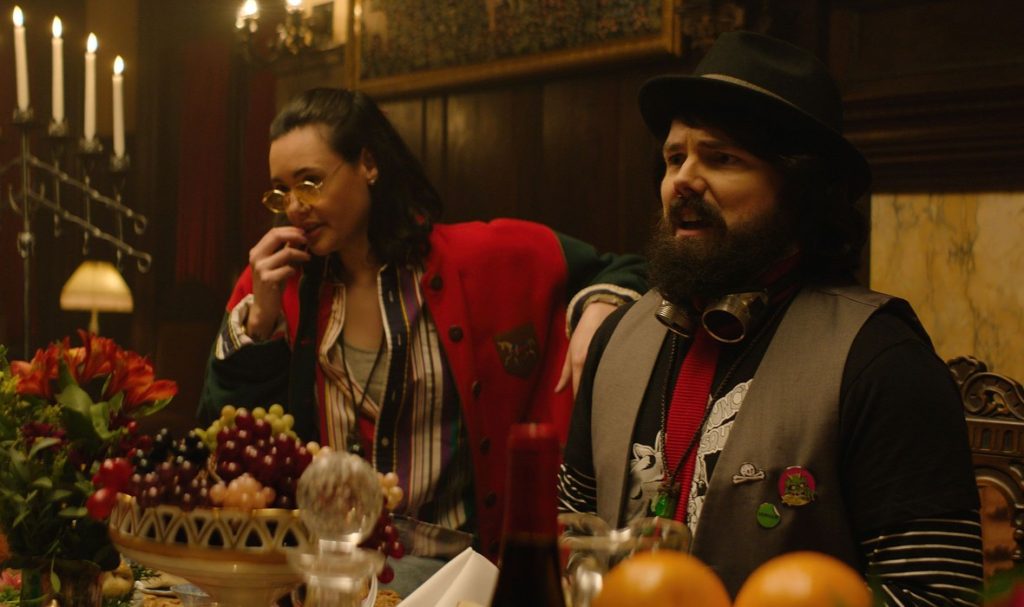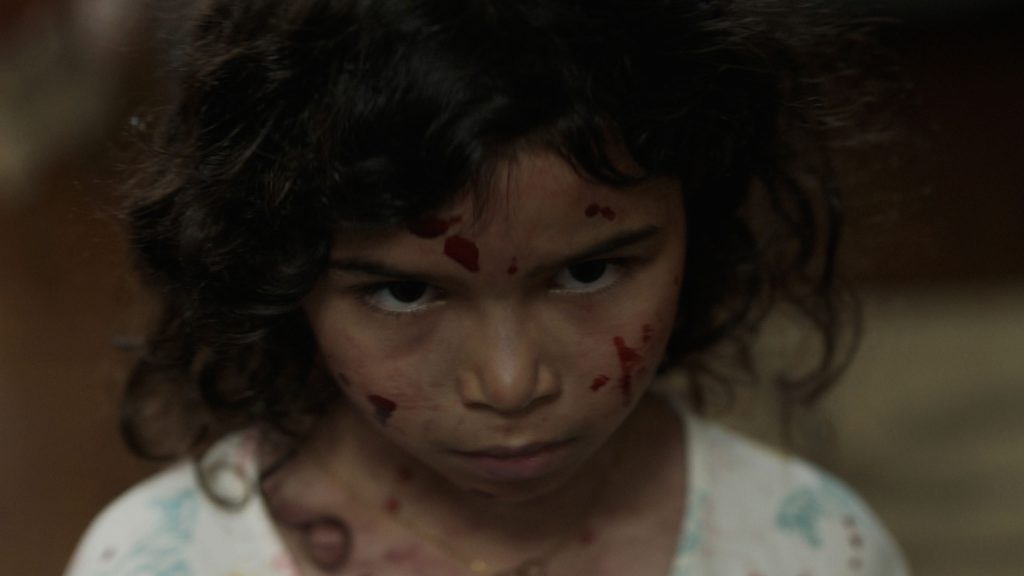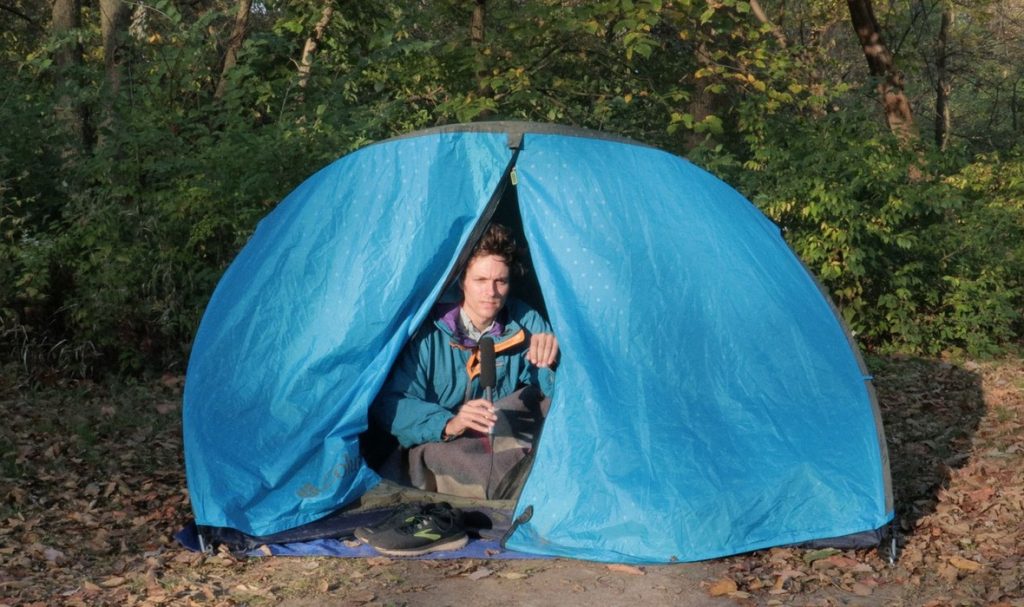Reviews include Irena’s Vow, The Beast, and Before I Change My Mind.
CUFF Keeps It Cool By Putting the Festival Audience First
May 15, 2023

By Jason Gorber
For the last two decades, Brenda Lieberman has helped make the city of Calgary just a little bit cooler. As director, lead programmer and co-founder the Calgary Underground Film Festival (CUFF), she heads a team that helps brings stories from around the world to the foothills of the Rockies. With Lieberman at the helm, CUFF fosters its local and loyal community of film fans every April by enriching not only their taste in genre cinema, but also providing a showcase to connect local and regional filmmakers with their audience.
I spoke with Lieberman about how CUFF got its start. “I went to the Toronto International Film Festival in 1999,” she recalls, “and when I came back home I realized that there weren’t any major film festivals started here yet. I spotted [that] someone had registered a domain name for a “Calgary International Film Festival,” and so I tracked them down, had coffee with them, and asked them to bring me on!”
That festival, CIFF, would launch in 2000. Today, it continues to flourish with Brenda now installed as its lead programmer, although they didn’t have a spot for her in the early years. Passion and ambition led her and her colleagues to create a separate festival that would not compete with CIFF’s September slate in terms of timing and with a focus on a different slate of titles to avoid conflict. “I was looking for films that felt a little edgier than would play at other festivals,” Lieberman remembers. “We were filling a void in the city. At the time, Calgary was very young in the art scene, and so this was a time when a lot of people in my demographic were starting events, businesses, or festivals.” The choices for her to fulfil her goals was obvious: “I could choose to stay in Calgary and help build the scene here, or move. Obviously, I decided to invest my energies here.”
CUFF began slowly, as most festivals do, but with a sizable slate to get things rolling. “In our first year, we had seven features and one shorts package,” notes Liberman. In contrast, in its 20th iteration, the increase is dramatic. As Lieberman proudly puts it, “In 2023, we had three shorts packages and over 40 features,” including best-of-other-fest selections and local premieres alike.
While some original contributors such as Andy Eyck, one of the founders of CIFF; Kari McQueen from Emmedia, a non-profit video production co-op; and Brian Batista from the Quickdraw Animation Society helped lay the foundation and have since moved on, it’s clear that a major force for keeping the festival intact and respected over the years has been down to the quiet diligence and near pathological selflessness of the festival head. Lieberman has for years surrounded herself by a new generation of equally engaged individuals. “In the late 2000s and into the next decade, we began to create a new team from those who were already fans of what we had built,” she says, turning audience members into core members of the staff. This includes lead programmers Brennan Tilley and Cam McGowan, who conduct many of the Q&As; Cole Binder, who serves as technical director; and Laura Carlson, who helped out with marketing and publicity, among many others who have helped grow the festival over the years.
As Lieberman suggests, the whole event has “been building with a natural progression organically, as the audience and community allows for it. It feels like it fits really well with the community.” This sense of community truly makes CUFF feel quite extraordinary, and witnessing the changes in the few years since I last attended it’s clear that the event tightly holds onto this sense of belonging for so many of the patrons that return year after year.
After having had some technical challenges at more than my share of festivals over the last few months, I also applaud Cole and his team for flawless presentation throughout. It helps that the venue is the Globe Cinema, with two 400+ seat rooms that work perfectly for the scope of the audience. This is one of those twin-screen multiplex theatres first built in the mid-1990s that may look its age at times, but has a retro cool that feels like a historic monument to in-person, old-school moviegoing. The Globe creates a true hub for the festival, where filmgoer and filmmaker alike can mingle outside each theatre. It’s a quick commute from the basement to the near identical screening room upstairs, making it super simple to navigate the schedule. It was in these two rooms that I had a chance to catch some of the more fun, fascinating, and engaging films I’ve seen this year while navigating a very busy festival circuit schedule.
The day before the festival was National Canadian Film Day, and as a lead up to CUFF, there was a free screening of Ron Mann’s 1988 documentary Comic Book Confidential. The film provides a fascinating snapshot of when comic book culture was far from the mainstream it occupies now, given that the most lucrative contemporary films and series often originate in the pulpy illustrated pages of the medium. Stylistically, the talking-head doc seems superficially straightforward, but the film’s use of animation, voiceover, and kinetic elements, then truly ground breaking, have been so normalized in documentary that it’s harder to see how provocative this film truly was in its time.
The restoration looked good, even if the 16:9 crop was often anathema to the carefully constructed panels being presented. The crowd absolutely ate up having insights from generations of artists and writers who are showcased by Mann. The film was shot in late-1980s, just prior to Tim Burton Batman that directly led to much more interest in comic books as fodder for him, eventually leading to the astronomical success of Christopher Nolan’s billion-dollar-grossing Gotham films and the eventual box office monopoly of the Marvel Cinematic Universe. Mann’s film thus captures a unique period of time just before the tsunami hit, resulting in a fascinating glimpse at an era where things still felt intimate and offbeat, challenging the status quo rather than fully forming it. The film showcases voices that provide witness to the earliest days of the medium right up to the provocateurs who would modernize it and some legends who would soon become household names, not simply known by those wandering the convention halls and comic book shops.
The official opening CUFF film was Andrew Bowser’s Onyx the Fortuitous and the Talisman of Souls, a film as purposely self-serious and ridiculous as its title would connote. With a cast that includes genre legends like Jeffery Combs and Barbara Crampton, this is the tale of a burger flipper who wins a Wonka-like contest to be part of a diabolical ritual, only to have the overt proceedings upended by even more nefarious machinations. This sardonic Satanist romp provides an outlet for Bowser to flesh out his baritone alter-ego, one that gained viral notoriety from a series of YouTube clips poking fun at the everyman witness captured in local news broadcasts.
Through maudlin Meatloaf references and more than a bit of pilfering from the likes of 1980s’ horror flicks like The Re-Animator, the well-inculcated audience was lapping up the fun. I went in blind to the shtick, and my knowledge of mid-’80s shlock is nowhere near that of my fellow audience members, but I was mostly swayed by the silliness. Bowser’s hypnotic, grandiose cadence for his character could easily grate when extended from five minute clip to feature film, yet there’s enough story drive, and some pretty committed and ambitious performances from the rest of the ensemble cast, that this Sundance-premiering film proved to be a formidable and, yes, fortuitous opening selection.

Another Sundance film, Birth/Rebirth, also toys with notions of bringing back the dead, but this one borrows far more from films and fiction directly in my wheelhouse. Director Laura Moss crafts this story of an introverted pathologist who secretly is engaging in medical experimentation in her apartment. When the daughter of a maternity nurse dies unexpectedly the two find themselves entwined in a plot to help bring her back, using their skills and access at healthcare facilities to facilitate this ethically dubious but emotionally provocative goal.
The narrative borrows heavily from the likes of Mary Shelley’s Frankenstein, of course, while stylistically sharing DNA with the likes of David Cronenberg’s Dead Ringers and The Fly. The cold, almost somber look to the film is augmented by extremely believable locations, where the world of these women feels as real as their actions prove to be chilling. It’s a slow burn film brimming with ideas, and while not every ingredient in the simmering brew fully comes to a boil, there’s plenty here to recommend for genre fans and general audiences alike.
On Saturday morning, CUFF traditionally hosts their screenings of cartoons, catered with tables of rare, often imported sugary cereals and plenty of milk, dairy or otherwise. It was rewarding to see hundreds of people show up, many in costume, for this in-person show. It’s a fantastic way to encourage fans of the fest to unwind, but it’s also an amazing opportunity for the younger generation to experience this sense of community inside a movie theatre, hopefully spawning a lifetime of fascination with the moving image on the giant canvas of the silver screen.
After spending an afternoon schlepping the film’s director and the one of the project’s spearheads Mike Mendez to a local Toys ‘R’ Us so that he could visit the retailer that’s been shuttered in the U.S.A., I screened Satanic Hispanics. These anthologies don’t often work for me, with the likes of ABC’s of Death or the VHS series having a mix of pretty good with some very bad chapters. Save for one particularly egregious section, there’s plenty to recommend about Mendez and co.’s film well beyond the obvious celebration of underrepresented communities coming together to tell their stories. Thanks to a workable wrap-around narrative that ties them together, as well as highlights that both begin and end the project, it’s worth sticking with it through the moments that don’t quite work knowing that you’ll be treated to a kind of reset as the new story begins.
Similarly, there’s not much about Cash Cow that should work – it’s a dry, painfully awkward and insular film about pizza delivery and the history of the Mormon Church. Yet thanks to a semi-documentary, Andy Kaufman-esque portrayal by the film’s director/star Matt Barats, this feels like a foundational micro-budget masterwork. It’s one of the most charming, effective COVID-era films I’ve yet seen. Perhaps the story of a freelancer waiting for a cheque spoke on deep levels to this sad scribe, but I was enthralled with its mix of a religious pilgrimage and hidden camera hijinks, speaking to a level of both self-delusion and auto-didacticism that perhaps hits a wee bit too close to home. Implausibly, the film is aesthetically quite grand, with the various locales providing a burst of autumnal beauty with bursts of banal Americana. It lands with a solid punchline, but the journey’s the thing. Barats’ own meanderings somehow coalesce into something quite special indeed.

Finally, I got a chance to screen Matt Johnson’s The Dirties a decade after it first premiered. It was good for me that I waited until after seeing where he and his team would go with the likes of Operation Avalanche and especially the recently-released BlackBerry. Johnson’s 2013 school shooting mockumentary still evokes its more obnoxious moments loudly, but I’m able to stomach its schoolboy hijinks mentality within the broader context of the commentary that was always there but I may have been unwilling to accept when it landed. It’s much easier now to see this film as not a simple prank but the first iteration of a kind of narrative diatribe that Johnson and his ensemble would continue to refine, resulting in films that walk the tightrope between farce and non-fiction.
If anything, The Dirties almost feels tame after the passage of time. The hapless planning of these characters have been supplanted by far more sinister actors, especially in the states with an ongoing epidemic of mass shootings, where store-bought body armour and Internet live streaming offers an even more macabre reality compare to The Dirties’ protagonist propping up GoPros in an attempt to push a student project to its limit.
Dozens of other films screened during the festival, including many that I’d seen at other festivals. It should not be underestimated how valuable it is for local audiences to catch-up on the likes of Sisu, Relax, I’m From the Future, BlackBerry, and other gems. Above all, CUFF provides a wonderfully warm and inviting environment to screen these films from around the world, with a carefully curated selection that manages to appease its audience with certain title and push boundaries and comfort levels with others. It’s one of the great places in this country to experience these films in a welcoming environment with an engaged audience, and thanks to a tireless team under the aegis of Lieberman, it truly is one of the jewels on the festival circuit. CUFF is well embraced by a local crowd, but it definitely deserves being attended by any lover of film from wherever you travel from.



